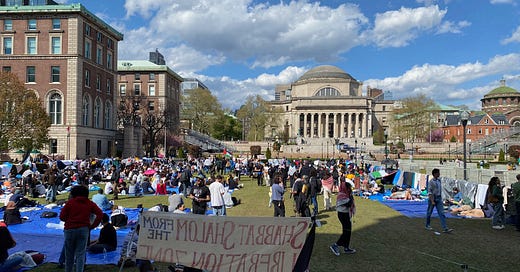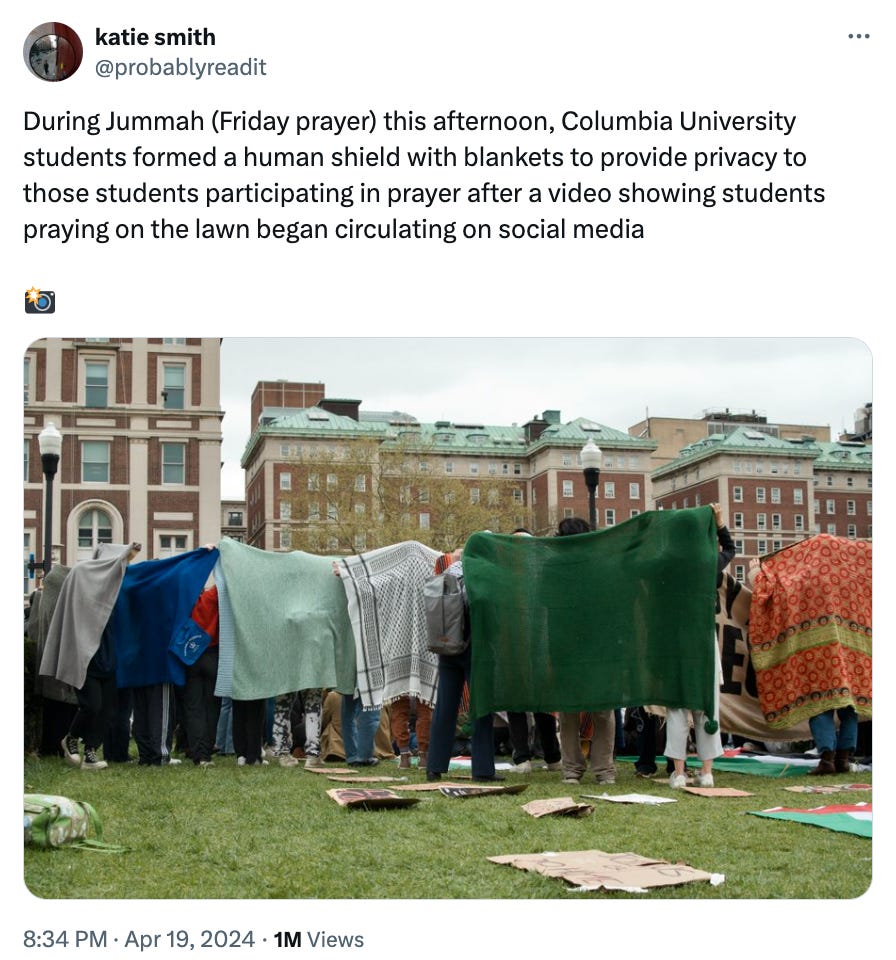Last night, as I filed the first of these notes, Jewish students conducted Shabbat service in the Liberated Zone. They gathered maybe ten metres away from me—in videos posted to social media, I can see myself in the background, trying to type away, routinely looking up to watch. I found the service beautiful, so beautiful that it became difficult to concentrate. The calls-and-responses of the service mirrored, in their own way, the political chants of the day. To end they sung to each other, and to all those watching, the words “ceasefire now”.
Minutes later their Muslim peers conducted their own prayer. The Muslim students have taken to praying in circles, obscured from view by a human shield of their fellow students who use blankets to provide privacy.
The concern became necessary because of people like Shai Davidai, a Columbia University Business School professor who has taken to sharing footage of praying Muslim students to Twitter, alongside the words “This is Columbia University, right now. Please share to let the world know.” In Australia we would call this a dog whistle. Earlier this week Davidai called for the use of the National Guard, as if hungering for a modern day Kent State Massacre, in which 13 students were shot, 4 of them killed. In an extraordinary feat of human psychology, this fully-employed adult man believes that it is the undergraduates who are intimidating him.
He is to my mind a transparently-hysterical racist cognitively unable to identify with any other position than victim. The bullying of students and the psychology that facilitates it is so contrary to the values of liberal education that he cannot be said to be fit to teach in a university. He remains employed.
But back to the Liberation Zone. The students are out there right now—I’ve stepped into the library to write these words—and they are prefiguring a new way of organising society. Words like these are meaningless and empty to any person who has not seen the inside of a protest movement at high morale. Most of us in this society have lost the hope that anything could ever be different; we have forgotten that things were different not too long ago, and will soon be different again. But on the far side of the wall to my right, a group of young people who have not yet learned to be hopeless are constructing at a small scale the world they hope to see come.
It is an extraordinary thing to watch. The students are highly organised. A constant stream of programming—from public speeches to chants to musical performances to training sessions to prayer groups—keeps the crowd entertained through the day. Leaders routinely coordinate site clean ups. Tarps and blankets and umbrellas are shared widely and managed communally. At night the students sleep on the grass—because the University removed their tents, they wrap themselves in tarps to keep off the rain. Jews and Muslims and people of every other faith coordinate peacefully to pressure the University to divest from the Israeli war machine. Meanwhile the University remains closed to the public; the riot police just outside.
‘It is worth stating plainly what happened at Columbia,’ writes Moira Donegan in The Guardian. ‘The raid was nothing less than the product of collusion between a university administration and rightwing politicians to suppress politically disfavored speech.’ And as Hank Reichman ably put it on the Academe Blog:
the arrests were but an escalation of a largely one-sided effort to silence student protest and even student debate and discussion that began last Fall with the swift banning of two pro-Palestinian student groups and the adoption of overly repressive new student conduct regulations at Barnard and Columbia, implemented with no faculty or student input.
Which is all to say that we are now 6 months into a concerted effort to put down dissent on campus. When Barnard and Columbia cynically banned the two pro-Palestinian student groups last autumn, I was extremely impressed with those faculty who objected publicly and vocally. But I was even more dismayed by how few there were.
In truth I have been been consistently disappointed by the majority of faculty at this university. They have in my estimation failed to deploy their considerable power to protect their students, and have considered it sufficient to shake their heads in disappointment at the administration. My strongest feelings are reserved for those protected by tenure. Many of them, even self-described radicals with famous books about the Subaltern, and so forth, have seen fit to not act, and have left the brunt of the responsibility to lesser known but clearly more principled faculty.
But even the more-precarious faculty are hardly off the hook. I have the sense that, as the university ecosystem has consistently shifted governance from faculty to the administration, piling more and more power in the hands of management and leaving less and less in the hands of educators, a kind of learned helplessness has emerged among those who once may have held sway. The time for serious action, one suspects, was long ago, when there was still a chance to halt the slow decline of the liberal university. As the old saying goes, the frogs are starting to boil in the pot. And now that the water is simmering, and the administration is using the state to suppress student speech, many faculty have found themselves unwilling or unable to protect those in their charge.
The lesson is not that all is lost but that things can still be different. It is only by exercising power that one gains power, and faculty are now presented with an opportunity to turn back the tide. I hear that some faculty are indeed now organising in just this direction. Good. They have before them an unambiguous cause for collective action at a point of maximum popular sympathy. The moment calls for an unrestrained demonstration of labour power in defence of their students, academic freedom, and pedagogy itself. Columbia faculty ought to collectively withhold their labour and march on campus until the suspended students are reinstated: it is time for faculty to show as much leadership as those they claim to teach.
As I left the Liberated Zone around 1am last night, the protestors were involved in a long call and response reaffirming their community values. The leader of this announcement, a young woman, started by asking the students to remember that the Gaza Solidarity Encampment was home to a broad coalition of political persuasions. For that reason she asked that students refrain from autonomous action, like vandalism—such actions might bring punishment on fellow students who do not support those tactics. The crowd assented. Then she made the same point about litter—the service staff of the University, after all, were also their comrades, and deserves the same respect and solidarity as those camped in the Liberated Zone. This, I thought, was real leadership.




